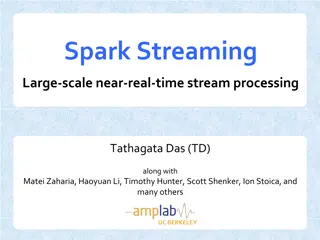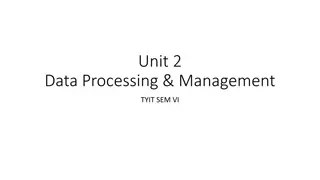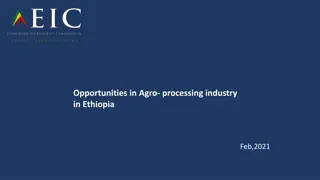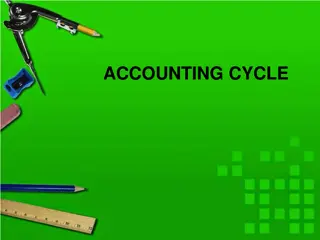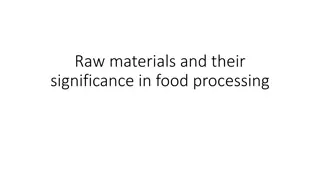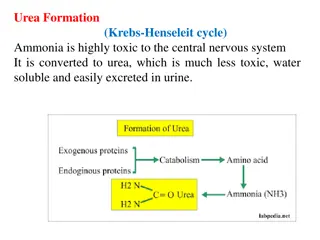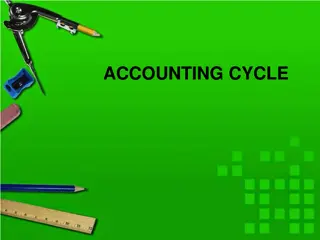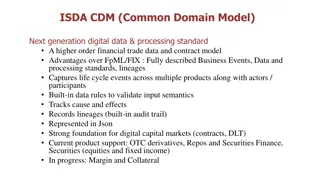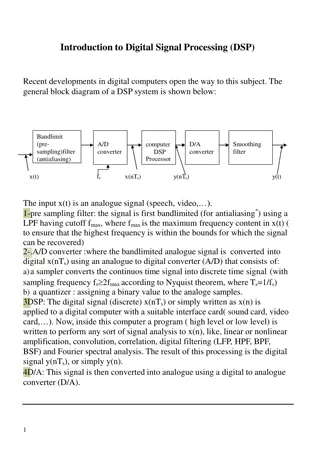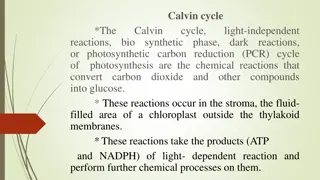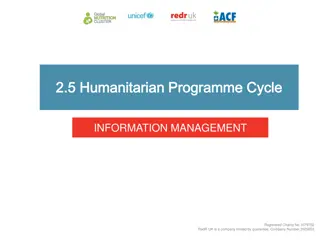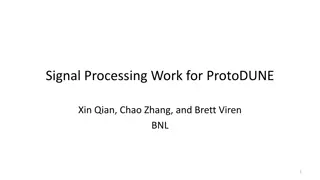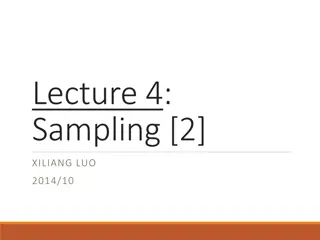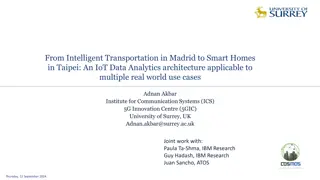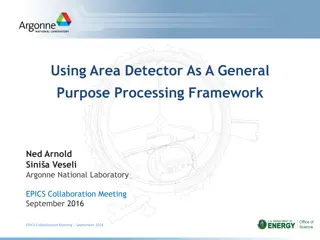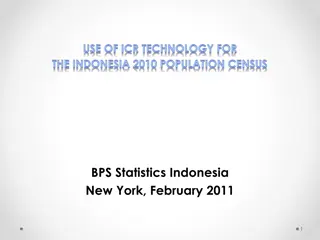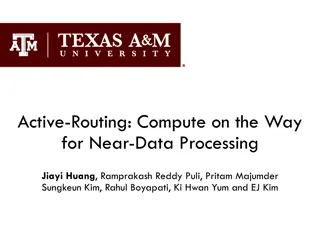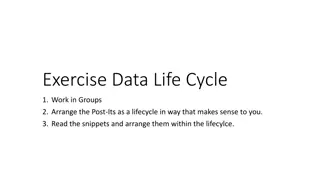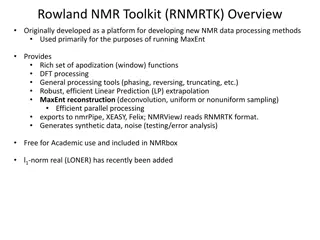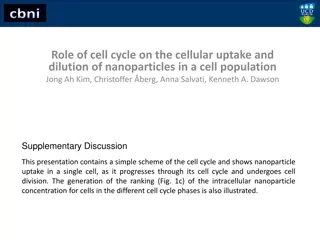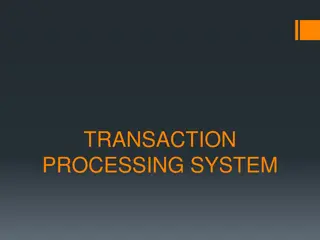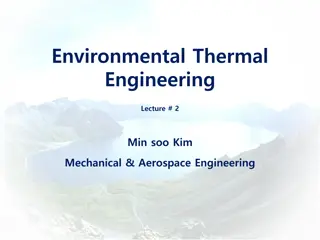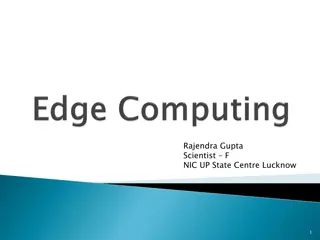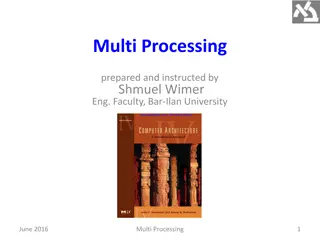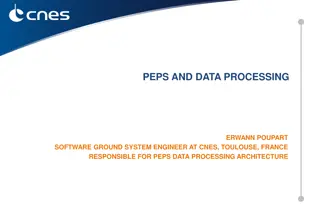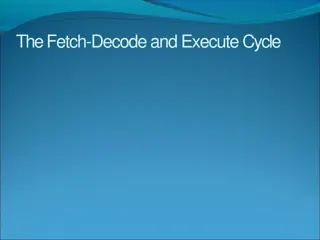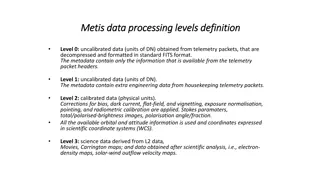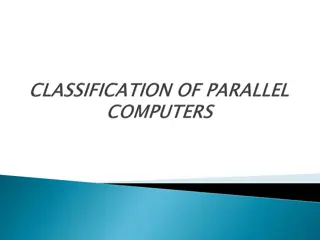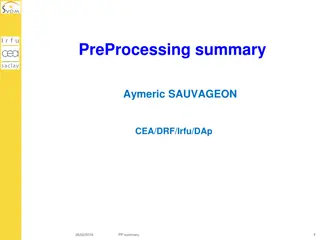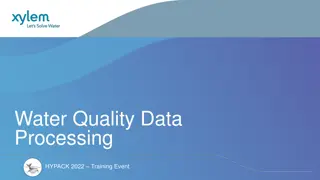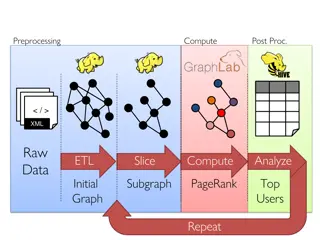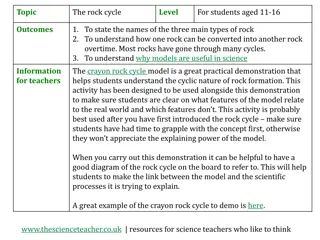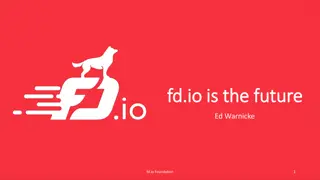National Food Processing Policy and Its Importance
National Food Processing Policy aims to address the significant wastage in food production through value addition and efficient processing. The policy highlights the reasons for food processing, including reducing losses in the supply chain and enhancing quality. It emphasizes creating an enabling e
1 views • 19 slides
Introduction to Spark Streaming for Large-Scale Stream Processing
Spark Streaming, developed at UC Berkeley, extends the capabilities of Apache Spark for large-scale, near-real-time stream processing. With the ability to scale to hundreds of nodes and achieve low latencies, Spark Streaming offers efficient and fault-tolerant stateful stream processing through a si
0 views • 30 slides
Real-Time Data Insights with Azure Databricks
Processing high-volume data in real-time can be achieved efficiently using Azure Databricks, a powerful Apache Spark-based analytics platform integrated with Microsoft Azure. By transitioning from batch processing to structured streaming, you can gain valuable real-time insights from your data, enab
0 views • 23 slides
Evolution of Data Processing Systems in Geographic Information Science
Data processing systems in Geographic Information Science have evolved from manual, analogue methods to advanced software and hardware components. The incorporation of Geographic Information Systems (GIS) has revolutionized the handling and analysis of geo-referenced data, making tasks like data cap
0 views • 20 slides
Opportunities in Ethiopia's Agro-Processing Industry
Ethiopia stands out as a leader in raw material production for agro-processing industries, offering opportunities in dairy, juice processing, edible oil processing, poultry, beef production, and tomato processing. With abundant resources, suitable climate conditions, and a growing domestic market, E
0 views • 8 slides
Understanding the Accounting Cycle Process
The accounting cycle is a comprehensive process that involves recording and processing all financial transactions of a company, from their occurrence to their representation in financial statements and closing of accounts. It is crucial for bookkeepers to manage the entire cycle, which includes step
0 views • 11 slides
Significance of Raw Materials in Food Processing
Effective selection of raw materials is crucial for ensuring the quality of processed food products. The quality of raw materials directly impacts the final products, making it important to procure materials that align closely with processing requirements. Quality evaluation, including microbiologic
2 views • 30 slides
Urea Biosynthesis and the Krebs-Henseleit Cycle in the Liver
Urea is synthesized in the liver through a series of enzymatic steps known as the urea cycle or Krebs-Henseleit cycle. This process involves converting toxic ammonia into urea, a less toxic and water-soluble compound that can be easily excreted in urine. The liver plays a crucial role in urea biosyn
1 views • 20 slides
Understanding the Accounting Cycle
The accounting cycle is a comprehensive process that involves recording and processing all financial transactions of a company, from their occurrence to their representation on financial statements and closing the accounts. This cycle, essential for bookkeepers, includes steps like transactions, jou
0 views • 11 slides
Next Generation Digital Data and Processing Standard in Financial Trade
ISDA CDM (Common Domain Model) presents a higher-order financial trade data and contract model with advantages over FpML/FIX. It offers fully described business events, data, and processing standards, capturing life cycle events across various products along with participants. The model includes bui
0 views • 4 slides
Understanding the EU General Data Protection Regulation (EU GDPR)
The EU General Data Protection Regulation (EU GDPR) is a comprehensive regulation that governs the processing of personal data of individuals in the EU. It came into effect on May 25, 2018, and applies to all organizations handling personal data of EU residents. The regulation includes key definitio
4 views • 21 slides
Overview of Digital Signal Processing (DSP) Systems and Implementations
Recent advancements in digital computers have paved the way for Digital Signal Processing (DSP). The DSP system involves bandlimiting, A/D conversion, DSP processing, D/A conversion, and smoothing filtering. This system enables the conversion of analog signals to digital, processing using digital co
0 views • 24 slides
Understanding the Calvin Cycle in Photosynthesis
The Calvin cycle, also known as the light-independent reactions, is a crucial part of photosynthesis where carbon dioxide is converted into glucose. This cycle occurs in the stroma of chloroplasts and utilizes ATP and NADPH from the light-dependent reactions to produce sugars for plants. It consists
5 views • 15 slides
Understanding the Humanitarian Programme Cycle (HPC)
The Humanitarian Programme Cycle (HPC) is a coordinated series of actions aimed at preparing for, managing, and delivering humanitarian responses efficiently. It focuses on delivering fast, coordinated, effective, and protection-driven aid to those affected by crises. Central to the HPC is the invol
2 views • 8 slides
Advancements in Signal Processing for ProtoDUNE Experiment
The team, including Xin Qian, Chao Zhang, and Brett Viren from BNL, leverages past experience in MicroBooNE to outline a comprehensive work plan for signal processing in ProtoDUNE. Their focus includes managing excess noise, addressing non-functional channels, and evolving signal processing techniqu
1 views • 23 slides
Understanding Sampling and Signal Processing Fundamentals
Sampling plays a crucial role in converting continuous-time signals into discrete-time signals for processing. This lecture covers periodic sampling, ideal sampling, Fourier transforms, Nyquist-Shannon sampling, and the processing of band-limited signals. It delves into the relationship between peri
1 views • 60 slides
Ideal Reheat Rankine Cycle Analysis for Steam Power Plant
Analyzing the thermal efficiency and mass flow rate of an ideal Rankine cycle with superheat and reheat using steam as the working fluid. The cycle involves stages of expansion, reheating, and condensing to generate a net power output of 100 MW. Detailed calculations for states of the cycle are prov
1 views • 5 slides
Adapting Contest Strategies for Declining Solar Cycle 24 and Solar Cycle 25 Precursors
As Solar Cycle 24 rapidly declines, preparations for the subsequent Solar Cycle 25 are crucial. Insights on weak solar activity, potentially weak Cycle 25, and the impact on contest strategies are discussed. Improved DX propagation, reliable openings, and signal strengths to Europe and Japan, amidst
0 views • 12 slides
IoT Data Analytics Architecture for Real-World Use Cases
Explore the IoT data analytics architecture proposed by Adnan Akbar from the University of Surrey, applicable to diverse real-world scenarios like smart homes in Taipei. Discover how IoT leverages the connection of everyday objects to the internet, enabling remote control of physical environments. D
0 views • 22 slides
Implementing Data Acquisition System Using Area Detector as General Processing Framework
The data acquisition system discussed in this content utilizes the Area Detector framework as a versatile processing tool for handling data from various technical subsystems. It covers aspects such as DAQ architecture, high-speed data transfer methods, time-correlated data collection, and usage of A
0 views • 8 slides
Overview of Population Census Data Processing in Indonesia
Background information on the population census in Indonesia, including details on the history of data processing methods used over the years, locations of data processing centers, flow of documents in the field, processing of documents, data flow in Information Technology, batching system structure
0 views • 17 slides
Enhancing Near-Data Processing with Active Routing
Explore the implementation and benefits of Active-Routing for efficient data processing in memory networks. Motivated by the increasing demands for memory in graph processing and deep learning, this approach aims to reduce data movement, energy consumption, and costs associated with processing large
0 views • 46 slides
Understanding Data Life Cycle in a Collaborative Setting
Explore the journey of data from collection to preservation in a group setting. Post-its are arranged to represent the different stages like Analyzing Data, Preserving Data, Processing Data, and more. Snippets cover tasks such as Collecting data, Migrating data, Managing and storing data, and more,
0 views • 4 slides
Fuel Cycle Analysis Toolbox: Enhancing Understanding and Optimization
This presentation focuses on the analyses and evaluations essential for assessing the potential of a fuel cycle, emphasizing different time scales, system sizes, objectives, and audiences. It discusses the need for coupled analyses, various tools required, and opportunities for improvement through i
1 views • 11 slides
Overview of RNMRTK Software for NMR Data Processing
Rowland NMR Toolkit (RNMRTK) is a comprehensive software platform primarily used for NMR data processing tasks such as running MaxEnt, apodization, DFT processing, linear prediction, and more. It offers a robust set of tools for various processing needs and supports efficient parallel processing. RN
0 views • 17 slides
Role of Cell Cycle in Nanoparticle Uptake and Dilution in Cell Population
The cell cycle plays a crucial role in the cellular uptake and dilution of nanoparticles within a cell population. This process involves different phases such as G1, S, G2, and M, each with specific functions related to cell growth, DNA synthesis, protein synthesis, and cell division. Understanding
0 views • 20 slides
Understanding Transaction Processing Systems (TPS)
Transaction Processing Systems (TPS) are vital components in capturing, storing, and processing data generated from various business transactions. They ensure efficient handling of high volumes of data while maintaining accuracy, security, and privacy. TPS operate through automated data entry, batch
0 views • 24 slides
Centre of Excellence in Signal Processing Activities and Progress Report
Broad areas of signal processing activities at the Centre of Excellence in Signal Processing include audio, speech, language, medical image processing, computer vision, wireless communications, and machine learning. The center focuses on addressing various challenges in audio/speech recognition, emo
0 views • 17 slides
Fundamentals of Environmental Thermal Engineering in Mechanical & Aerospace Engineering
Explore the key concepts of environmental thermal engineering in Mechanical & Aerospace Engineering, covering topics such as the Carnot cycle, actual vapor-compression cycle, principles of the vapor-compression cycle, Carnot heat engine, refrigeration cycle, and coefficient of performance. Understan
0 views • 51 slides
Understanding Edge Computing for Optimizing Internet Devices
Edge computing brings computing closer to the data source, minimizing communication distances between client and server for reduced latency and bandwidth usage. Distributed in device nodes, edge computing optimizes processing in smart devices instead of centralized cloud environments, enhancing data
0 views • 32 slides
Understanding Multi-Processing in Computer Architecture
Beginning in the mid-2000s, a shift towards multi-processing emerged due to limitations in uniprocessor performance gains. This led to the development of multiprocessors like multicore systems, enabling enhanced performance through parallel processing. The taxonomy of Flynn categories, including SIS
0 views • 46 slides
Insight into PEPS Data Processing Architecture by Erwann Poupard
Erwann Poupard, a Software Ground System Engineer at CNES, Toulouse, France, plays a crucial role in the PEPS data processing architecture. The outline covers PEPS HPSS data storage statistics, current data processing trends, and future plans including PEPS V2 development. Explore PEPS processing ch
0 views • 8 slides
Understanding the Fetch-Decode-Execute Cycle in Computer Processing
Exploring the fundamental process of executing a program in a computer through the fetch-decode-execute cycle. This cycle involves loading programs and data into the computer's memory, fetching and executing instructions sequentially, and managing memory operations effectively. The interaction betwe
0 views • 13 slides
Overview of Metis Data Processing Levels and Science Analysis
Metis data processing involves different levels of data calibration and transformation. Level 0 provides uncalibrated data in standard FITS format, while Level 1 includes extra engineering data. Level 2 offers calibrated data with various corrections applied. Level 3 comprises science data derived f
0 views • 8 slides
Parallel Processing in Computer Organization
Computers can be classified based on data and instruction streams, forming various types of structures. Parallel processing levels can be defined based on instruction and data stream categorization, proposed by Michael Flynn in 1972. The instruction cycle consists of steps needed for executing instr
0 views • 44 slides
Data Processing and Preprocessing Summary
In this document, Aymeric Sauvageon from CEA/DRF/Irfu/DAp presents a detailed overview of the preprocessing steps involved in data processing from L0 to L1. It covers the definition of L0/L1 and coding, utilization of the database for processing, input file specifications from China, packet content
0 views • 11 slides
HYPACK 2022 Training Event: Water Quality Data Processing Overview
In the HYPACK 2022 Training Event, participants will learn about processing water quality sensor data, ADCP in-situ data, and geodetic parameters. The session covers tools included in HYPACK, changes to streamline workflows, and the Environmental Editor program for loading and processing data. Atten
0 views • 12 slides
Data Processing and Analysis for Graph-Based Algorithms
This content delves into the preprocessing, computing, post-processing, and analysis of raw XML data for graph-based algorithms. It covers topics such as data ETL, graph analytics, PageRank computation, and identifying top users. Various tools and frameworks like GraphX, Spark, Giraph, and GraphLab
0 views • 8 slides
Exploring the Rock Cycle Using the Crayon Rock Cycle Model
This educational resource focuses on teaching students aged 11-16 about the rock cycle, including the types of rocks, how rocks transform over time, and the importance of models in science. It introduces the crayon rock cycle model as a hands-on demonstration to help students grasp the cyclic nature
0 views • 4 slides
The Future of Fast Data Processing with fd.io VPP
Explore the future of fast data processing through the innovative fd.io VPP technology. VPP stands as a high-performance packet processing platform running on commodity CPUs. It leverages DPDK for optimal data plane management and boasts fully programmable features like IPv4/IPv6 support, MPLS-GRE,
0 views • 15 slides

